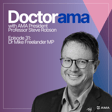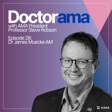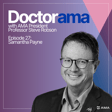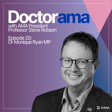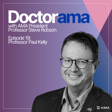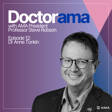Become a Creator today!Start creating today - Share your story with the world!
Start for free
00:00:00
00:00:01

Episode 16 - The Hon. Mark Butler MP
In episode 16 of Doctorama AMA President Professor Steve Robson chats with Minister for Health and Aged Care the Hon. Mark Butler MP.
Recommended
Transcript
Introduction of Mark Butler
00:00:00
Speaker
Well, the budget of the Commonwealth Department of Health and Age Care is well over $100 billion a year and that sounds like a big responsibility. Today, I'm going to be talking to the person who holds that responsibility on Dr Rama. You're listening to Dr Rama with Steve Robson, bringing you the best of health, medicine and people.
00:00:25
Speaker
Well, my guest today on the Dr Rama podcast is the Honourable Member for Hindmarsh and Federal Minister for Health and Age Care, Mark Butler, MP. Welcome to Dr Rama, Mark. Thank you, Steve. I'm very impressed by the breadth of your multi-skilling.
00:00:41
Speaker
Now, I did about three years of my specialist training at the Queen Elizabeth Hospital in Woodville. And if I'm not mistaken, that's just in your electorate. Yes, that is my local hospital. It's been the hospital, as you'd know, for the western suburbs of Adelaide since, I think, the early 1960s. So a very important part of the social fabric in Adelaide's west.
00:01:04
Speaker
Yeah, it was a fantastic place for teaching and I spent three years there and have such fond memories.
Political Journey and Early Career
00:01:12
Speaker
Mark, a lot of people will see you and hear you and hear from you, but a lot of people won't understand the pathway that led you up to being the Minister. So I'd really love to hear how you got into politics and a little bit about your pathway through to becoming the Federal Health Minister now. It was a long pathway, Steve.
00:01:35
Speaker
My mum was, so many of us are shaped by our mothers, aren't we? My mum was very political. She was active in the Labor Party, worked for all of the Hawke campaigns in the 1980s, signed me up, I'm not sure I had any choice, signed me up to the party very early and had me campaigning as a young teenager.
00:01:57
Speaker
Then, for a uni, I had the great pleasure of a terrific group of people at Adelaide Uni. Penny Wong was in my year at law school, Jay Weatherill, who became South Australian Premier, very close friends, and so people who were quite active in the Labor Party.
00:02:13
Speaker
And also a lot of people who became quite a significant political journalist, Annabel Crabbe, Samantha Maiden, and a number of others as well. So it was a very political start to my life. And the week after I finished university, I started work as an industrial advocate at
00:02:34
Speaker
a union which was then called the miscellaneous workers union which in south australia is essentially a health union julie gillard's dad was on the interview panel he was a he was a he was what we used to call a psych nurse steve
00:02:50
Speaker
an old school psych nurse. He was right at the end of his career. Julia would talk about having watched her dad, who was a psychiatric nurse at the Glenside Hospital, which was one of the two big psychiatric hospitals in Adelaide. She and I went to the same school in Adelaide-Unley High at different times, but she'd go to Glenside and see him after school.
00:03:12
Speaker
and watching his career change with the nature of mental health. In the early part of his career, when she was quite young, dressed not unlike, frankly, a prison officer. It was very much a custodial focus more than a therapeutic focus, she would say. I know talking to a lot of those old
00:03:34
Speaker
older generation of psych nurses, that really is what it was. But watching his career progress in line with a very different attitude to residential psychiatric hospitals. So anyway, the first 15 years of my work was really in health, particularly in hospitals, in mental health, in aged care and in disabilities, as well as some other sectors like childcare.
00:04:01
Speaker
until I got elected to the parliament in 2007 in the Kevin-07 election.
Entering Health Portfolio
00:04:09
Speaker
I spent time on the back bench for a little while and then got the call from Kevin in
00:04:18
Speaker
The middle of 2009, I'd been in Parliament 18 months and invited to become the Parliament to a Secretary for Health. So that was the beginning of my four years in the health portfolio under Kevin and then Julia.
00:04:33
Speaker
I remember it well. It was the week that Christine Bennett delivered her Health and Hospitals Reform Commission report. You'd remember, Steve, a lot of activity happening, a lot of discussion about health reform. We had the Preventative Health Task Force at the time.
00:04:49
Speaker
a lot of work in primary care with the creation of Medicare locals and a range of other things and then a very sort of public attempt to land a new approach to health and hospitals funding with the state. So it was an exciting time to join the health portfolio and then after a little while
00:05:07
Speaker
I was appointed as the Minister for Mental Health and Ageing which I held for about three years under Julia. Now you have been the Health Minister for quite a while now and health is notorious for having a large number of stakeholders.
00:05:25
Speaker
How easy did you find it to meet all of the stakeholders or the stakeholder groups, build those relationships with them? How's that been for you? It's one of the things I love about the job. It's hard because there's a huge number of them.
00:05:42
Speaker
As you say, I don't think there's a portfolio in government that has as many stakeholders. There are only so many hours in the day and it is hard to get around them, but it's an absolute pleasure. The thing I love about this portfolio is everyone in it is motivated by the highest of
00:06:05
Speaker
intent. Everyone's in there to help their fellow human being to cure cancer, to deliver babies. It's such a terrific group of hundreds of thousands of people and their stakeholder representatives. They can be confronting. They've got their case to advance.
00:06:25
Speaker
as I think I've said once or twice, there are sharp elbows in the health policy arena. But the thing I love about the portfolio is everyone comes to the table or to the National Press Club or to a media interview with the best of intentions, and that is to improve the health of their fellow Australians. So, you know, it is a challenge to
00:06:51
Speaker
I mean, you'd have this as president of the AMA, Stephen, with all of your other responsibilities, including broadcasting journalists now. It's always a challenge to arrange your time and to spread the love, if you like, and make sure that you're seeing as many people as possible. But you do actually have to find time to think, find time to read.
00:07:13
Speaker
find time to talk with your staff and your department as well about actually doing things. As I said in my intro, I've been a minister, a shadow minister now for a while. When we came back to government almost two years ago, having had four years as a health minister of some description in the previous government,
00:07:39
Speaker
I knew the stakeholders, some of the personalities had changed, but I've had a pretty good background with a lot of the stakeholders. Many of them, frankly, I'd worked with well before I was in parliament as well. So that helps.
Tackling Public Health Challenges
00:07:54
Speaker
Since you've been in government, nobody could say that you're afraid to take a bold step when it's required. And you and I have spoken about vaping on a number of occasions. And that's been something that's garnered absolutely international attention. And as you know, praise from all of the health and public health groups around the country. What was it that convinced you to take such bold action when it is notoriously difficult thing to do?
00:08:24
Speaker
You were in some of these discussions representing the AMA, Steve, when I pulled together some roundtables to talk about, first of all, how we take the next steps on traditional tobacco control. Not much had been done for 10 years. And Nicola Roxanne's plain packaging laws were about to sunset. So we had to talk about what next to do in traditional tobacco control.
00:08:49
Speaker
But as you know, the tobacco control groups and the medical groups like yours were raising this new challenge of vaping. And it is new. I mean, it's been around for a little while, but it exploded over the course of COVID, as you know. And again, to speak frankly, I think you will remember in some of those early discussions that I was a bit tentative. I did want to explore
00:09:14
Speaker
different options for our response before I took a view to the rest of government, to the Prime Minister, and others for us to take a decision. Some of those involve questions like,
00:09:28
Speaker
can we rationally ban vaping while not taking a prohibition approach to cigarettes? Will there be a transfer from vaping to cigarettes? Why I feel confident about the position we arrived at is because stakeholders like yours, the traditional tobacco control groups, are very generous with their time
00:09:50
Speaker
to allow us to really talk through the options, to stress test them, to keep the tyres on the position we ultimately arrived at and I feel very confident it's the right decision. I was talking to someone, I'm backing my electorate after a fortnight in Parliament, as I think, you know, actually I was talking to someone just an hour or two ago from my community who had just come from a swimming lesson
00:10:14
Speaker
And one of the parents there was beside herself. Her mother was beside herself because her grade five didn't want to go to the school camp.
00:10:23
Speaker
because he's an asthmatic, and he knows all of his fellow grade 5s were intending to take vapes there, and he's really scared that he'll be under pressure to vape, and it will cause him real harm because he's an asthmatic. And I hear these stories all the time. We think about this being a particular challenge in high schools, but I hear these stories in primary schools. I think you might have been in one of the round tables where
00:10:52
Speaker
the Victorian government or someone running the quit line talked about a 13-year-old asking for advice about how she resists the peer group pressure to vape that she feels under from all of the other 13-year-olds in her class. So we can still stamp this out. I mean, if we knew what we know now and could go back in time 100 years ago with, I'm sure,
00:11:20
Speaker
do what we could to stamp out cigarettes before they became as deeply entrenched in not just Australian society, but society worldwide. We can do that on vaping. It's not going to be easy. I've tried not to pretend that we can stop every vape from coming into the country or stop every vape from being sold, but it is out of control here. You would have seen the research from WA
00:11:44
Speaker
that is national that found that 90% of vape stores are within walking distance of a school. And that's no accident. That's an extraordinary study and I think it made absolutely clear that the action that's been taken is precisely the right action. So again, we've stood with you on this, you know, all the public health groups in the country are right behind you on this.
00:12:06
Speaker
Look, I wanted to change tack a little bit here. Obviously, Australians got quite a unique mix of public and private healthcare. You've had a chance to consider all of this at the moment. How do you think that mix is going for Australians at the moment?
Australia's Healthcare System Overview
00:12:22
Speaker
Do you think it's working and delivering the healthcare that we need?
00:12:24
Speaker
Well, I think any answer to a broad question about how healthcare systems are performing needs to be contextualised. As you know, every healthcare system around the world is under enormous pressure right now. I mean, ours, particularly Western health systems have been grappling with demographic change now for 10 or 20 years. The ageing of the population that we obviously knew was coming
00:12:54
Speaker
the growing burden of chronic disease, complexity of that chronic disease, but then all of that being aggravated by the pressures of a four plus year pandemic. And so all of the elements of our healthcare system are under pressure. And if you look across the world, as your listeners look across the world, and I know you do,
00:13:18
Speaker
You see that everywhere and in many cases it's actually under much bigger pressure than I think we are here in Australia, the NHS for example. We have some real pressures in our public hospital systems. There are real pressures in private hospitals, particularly in some areas like psychiatric admissions. And there's obvious pressure in primary care and general practice that there's been a lot of public discussion about.
00:13:48
Speaker
I think one of the strengths of our system is the way in which the public and private systems broadly complement each other and that's been a long-standing
00:14:00
Speaker
position of labour. After the debate of the 1940s, as Atlee was putting in place the NHS and ultimately your organisation resisting some of the work that Chifley was seeking to do, we arrived at that settlement in the referendum
00:14:19
Speaker
with the prohibition against civic conscription that was sort of a bit underwritten by Menzies, by the BMA then, or the AMA now, and by the Labour government, meant that we're always going to have a mix of private and public. And I think broadly that serves us well. When I look at the UK and the US, I think the two systems interact better here than in most other places. You're obviously closer to it than me, but that's certainly my view.
00:14:49
Speaker
There are, though, a range of aspects of that interaction that I think require a refresh. The AMA is very active in its advocacy about different ways to regulate private health insurance. I think that's a terrific contribution to public debate.
00:15:06
Speaker
You know that I've inherited a range of reviews that Greg Hunt initiated to essentially the private health insurance reforms that Howard put in place 24 years ago. That's timely. Been a lot of change since then and we're going to have to respond to those. I think some of the sort of red lines between the Medicare system and the private system serve us well.
00:15:36
Speaker
So private health insurance is able to underwrite work in some areas, but not in traditional areas that you do want.
00:15:47
Speaker
underwritten by a universal health insurance system like Medicare. That sound, I don't see a change foreseeably to that. But look, there are pressures on all elements of our system right now that we're going to be working through for a considerable period, yet this pandemic is going to have a long tail, whether it's about the consequences of deferred care, increased
00:16:15
Speaker
all of the missed cancer screens, all of those sorts of things in terms of demand, but also on the supply side, the workforce pressures, some of which were there before COVID, but again were aggravated by COVID means all elements of the system are going to be under pressure for a while.
Focus on Indigenous Health
00:16:33
Speaker
Mark, one of the things that is very close to my heart, and I'm one of the chairs of our task force on Indigenous health, is closing the gap on health for Aboriginal and Torres Strait Islander Australians. I know it's important to you. Have you had any thoughts on ways that you'd like to see further work done for our First Nations Australians and their health?
00:16:58
Speaker
Well, the first thing to say, as you know, Steve, is that the latest Closing the Gap report and implementation plan were tabled in Parliament earlier this week on the anniversary of the National Apology of the Stolen Generations and shows that we're still well off track and in some areas actually going backwards, particularly in early childhood, which I know would be of particular interest to you.
00:17:25
Speaker
I've been in every one of those reports because I was there at the Apology as a very new member and they are always confronting and always slightly depressing occasions.
00:17:41
Speaker
One of the things I would like to see us work more on and we're trying to do this in the Commonwealth is the transition of more responsibility to community control. I mean, I think one of the great shining jewels of the Australian health system and I think probably the shining jewel in Indigenous affairs is the Aboriginal community controlled health sector.
00:18:07
Speaker
overseen by Nutshow. I think it is a terrific model of primary care, works in very challenging circumstances, particularly outside of our cities and some of the most remote parts of Australia. And in those circumstances does a terrific job and I think there are opportunities to build that capability
00:18:29
Speaker
that haven't really been grasped over recent years. I've got my department, I've been quite public about this, I've got my department going through effectively an audit of all of the programs that are directed at Indigenous Health.
00:18:46
Speaker
to ask the question, if they're not being delivered by Indigenous community controlled organisations, why not? And is there a transition plan for those? One example is the Puggy Hunter Nurses Scholarship Program, building the Indigenous nurse workforce of the future. That should be delivered by an Indigenous organisation. I mean, it's named after the first inaugural chair of
00:19:09
Speaker
of nacho. Building capability, I think, is an important thing, but there are still huge gaps in treatment as well. Rheumatic heart disease, I think, got a really gratifying amount of public attention last year.
00:19:31
Speaker
compared to really not much community discussion at all, probably for decades, since it was largely eradicated from our major cities. So there is more we can do in communities to deal with rheumatic heart disease when it emerges, but we should really be trying to get to the root cause of it.
00:19:50
Speaker
which is ultimately, as you know, an environmental health sanitation question. How do we get upstream for some of these things? Absolutely. Now, look, you and I both are going to be out of these roles at some stage. It's inevitable.
Legacy and Future Perspectives
00:20:06
Speaker
So I'm going to ask you, when you move on for whatever reason from the role you're doing at the moment, what would you like your legacy to be from your time as the federal health minister?
00:20:19
Speaker
I hesitate to pick a couple out, but I really do want us to get on top of vaping as a country because I fear that if we don't over the next year or two, it's going to be very, very difficult to turn things around.
00:20:40
Speaker
So, I would like to see that as a legacy, not particularly of mine, but of these times, because I think there is a very broad consensus behind action. And it's not just the public health groups who really did the hard work coming up with the plan, but it's, as I said, parent groups are utterly beside themselves. They don't understand how this happened.
00:21:06
Speaker
They're quite angry that it was allowed to happen and they expect action. That, I think, is really important. As you know, we celebrated the 40th anniversary of Medicare this month. For a labor person particularly, that is a very proud legacy for us.
00:21:29
Speaker
up until the 90s, probably for the best part of a quarter of a century, the defining fault line really in national politics. Really from the time Gough adopted it as a central part of his 1969 platform, really right into the middle of the 1990s. It was in contest, as you know. But probably the major difference between the two major parties.
00:21:57
Speaker
establishing those deep roots for what I think is now Australia's most important social program and one deeply cherished by the Australian people is something we're very proud of as a Labour Party. And I think the current generation, which includes me, feel a responsibility to make sure that it's fit for purpose and secure for the future. And I think that's something that's a responsibility. I feel very deeply.
00:22:27
Speaker
I know stakeholders right through the health system do as well, needed that financial injection we provided in last year's budget, but also needs a substantial period of reform, steady, not overnight, steady reform that sees a system that was very much built for the patient need of the 1980s.
00:22:51
Speaker
reshaped to fit the patient need of the 2020s and the 2030s, which as you know far better than me, Steve, is quite a different need. Much more complex chronic disease needing more sort of wraparound multi-disciplinary care than the sort of episodic care that tended to characterize the work of particularly general practice in the 80s.
00:23:14
Speaker
Mark, it's always a pleasure talking to you. I'm very grateful you've given up the time because I can only imagine how full your diary is. But it's been great speaking to you on Dr Rama. So I hope you managed to get the weekend off. My great pleasure, Steve. See you soon. Pleasure. Thanks very much.
00:23:42
Speaker
You've been listening to Dr Rama, a podcast produced on Ngunnawal country by the Australian Medical Association. All rights reserved.
